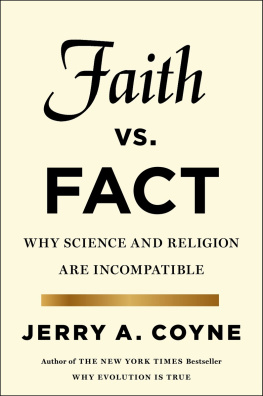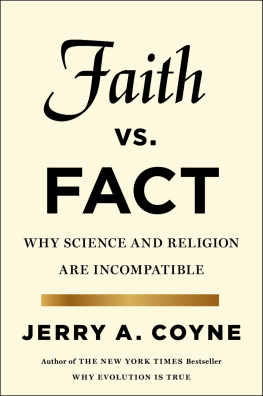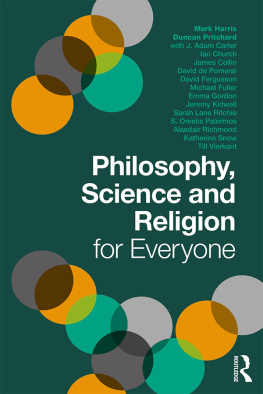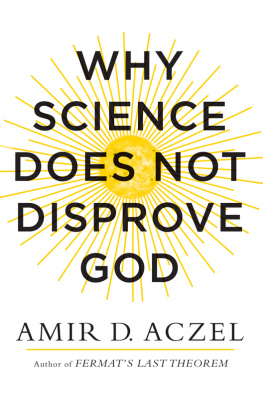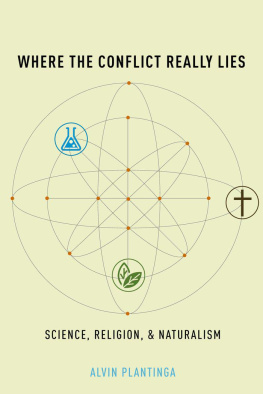ALSO BY JERRY A. COYNE
Speciation (with H. Allen Orr)
Why Evolution Is True
VIKING
Published by the Penguin Publishing Group
Penguin Random House LLC
375 Hudson Street
New York, New York 10014

USA | Canada | UK | Ireland | Australia | New Zealand | India | South Africa | China
penguin.com
A Penguin Random House Company
First published by Viking Penguin, an imprint of Penguin Publishing Group, a division of Penguin Random House LLC, 2015
Copyright 2015 by Jerry A. Coyne
Penguin supports copyright. Copyright fuels creativity, encourages diverse voices, promotes free speech, and creates a vibrant culture. Thank you for buying an authorized edition of this book and for complying with copyright laws by not reproducing, scanning, or distributing any part of it in any form without permission. You are supporting writers and allowing Penguin to continue to publish books for every reader.
Coyne, Jerry A., 1949
Faith versus fact : why science and religion are incompatible / Jerry A. Coyne.
pages cm
Includes bibliographical references and index.
ISBN 978-0-698-19551-6
1. Religion and science. 2. Faith and reason. I. Title.
BL240.3.C69 2015
201.65dc23
2015001103
Version_1
To Bruce Grant, my first mentor in science, and Magorzata, Andrzej, and Hili Koraszewscy, for providing a warm, secular haven for thinking and writing
, and, as such, stands in need of proof: the onus probandi [burden of proof] rests on the theist.
Percy Bysshe Shelley
the benefits of theology and science. When the theologian governed the world, it was covered with huts and hovels for the many, palaces and cathedrals for the few. To nearly all the children of men, reading and writing were unknown arts. The poor were clad in rags and skinsthey devoured crusts, and gnawed bones. The day of Science dawned, and the luxuries of a century ago are the necessities of to-day. Men in the middle ranks of life have more of the conveniences and elegancies than the princes and kings of the theological times. But above and over all this, is the development of mind. There is more of value in the brain of an average man of to-dayof a master-mechanic, of a chemist, of a naturalist, of an inventor, than there was in the brain of the world four hundred years ago.
These blessings did not fall from the skies. These benefits did not drop from the outstretched hands of priests. They were not found in cathedrals or behind altarsneither were they searched for with holy candles. They were not discovered by the closed eyes of prayer, nor did they come in answer to superstitious supplication. They are the children of freedom, the gifts of reason, observation and experienceand for them all, man is indebted to man.
Robert Green Ingersoll
PREFACE
The Genesis of This Book
is that its true whether or not you believe in it.
Neil deGrasse Tyson
I n February 2013, I debated a young Lutheran theologian on a hot-button topic: Are science and religion compatible? The site was the historic Circular Congregational Church in Charleston, South Carolina, one of the oldest churches in the American South. After both of us gave our twenty-minute spiels (she argued yes, while I said no), we were asked to sum up our views in a single sentence. I cant remember my own prcis, but I clearly recall the theologians words: We must always remember that faith is a gift.
This was one of those lesprit descalier, or wit of the staircase, moments, when you come up with the perfect responsebut only well after the opportunity has passed. For shortly after the debate was over, I not only remembered that Gift is the German word for poison, but saw clearly that the theologians parting words undercut her very thesis that science and religion are compatible. Whatever I actually said, what I should have said was this: Faith may be a gift in religion, but in science its poison, for faith is no way to find truth.
This book gives me a chance to say that now. It is about the different ways that science and religion regard faith, ways that make them incompatible for discovering whats true about our universe. My thesis is that religion and science compete in many ways to describe realitythey both make existence claims about what is realbut use different tools to meet this goal. And I argue that the toolkit of science, based on reason and empirical study, is reliable, while that of religionincluding faith, dogma, and revelationis unreliable and leads to incorrect, untestable, or conflicting conclusions. Indeed, by relying on faith rather than evidence, religion renders itself incapable of finding truth.
I maintain, thenand here I diverge from the many accommodationists who see religion and science, if not harmonious or complementary, at least as not in conflictthat religion and science are engaged in a kind of war: a war for understanding, a war about whether we should have good reasons for what we accept as true.
Although this book deals with the conflict between religion and science, I see this as only one battle in a wider wara war between rationality and superstition. Religion is but a single brand of superstition (others include beliefs in astrology, paranormal phenomena, homeopathy, and spiritual healing), but it is the most widespread and harmful form of superstition. And science is but one form of rationality (philosophy and mathematics are others), but it is a highly developed form, and the only one capable of describing and understanding reality. All superstitions that purport to give truths are actually forms of pseudoscience, and all use similar tactics to immunize themselves against disproof. As well see, advocates of pseudosciences like homeopathy or ESP often support their beliefs using the same arguments employed by theologians to defend their faith.
While the science-versus-religion debate is one battle in the war between rationality and irrationality, I concentrate on it for several reasons. First, the controversy has become more widespread and visible, most likely because of a new element in the criticism of religion. The most novel aspect of New Atheismthe form of disbelief that distinguishes the views of writers like Sam Harris and Richard Dawkins from the old atheism of people like Jean-Paul Sartre and Bertrand Russellis the observation that most religions are grounded in claims that can be regarded as scientific. That is, God, and the tenets of many religions, are hypotheses that can, at least in principle, be examined by science and reason. If religious claims cant be substantiated with reliable evidence, the argument goes, they should, like dubious scientific claims, be rejected until more data arrive. This argument is buttressed by new developments in science, in areas like cosmology, neurobiology, and evolutionary biology. Discoveries in those fields have undermined religious claims that phenomena like the origin of the universe and the existence of human morality and consciousness defy scientific explanation and are therefore evidence for God. Seeing their bailiwick shrinking, the faithful have become more insistent that religion is actually a way of understanding nature that complements science. But the most important reason to concentrate on religion rather than other forms of irrationality is not to document a historical conflict, but because, among all forms of superstition, religion has by far the most potential for public harm. Few are damaged by belief in astrology; but, as well see in the final chapter, many have been harmed by belief in a particular god or by the idea that faith is a virtue.

